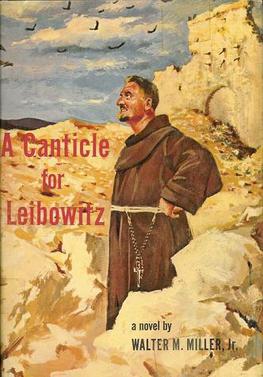on
'A Canticle for Lebowitz' and Five Questions, with Richard Moran
A Canticle for Lebowitz by Walter M. Miller, Jr., (first published in 1959) should be required reading for everyone. Let’s knock out The Scarlet Letter for this book, perhaps? I think the Freshmen Class of America is ready for that switch.
At the very least it should be required for everyone studying engineering.
I listened to several episodes of the podcast 5 Questions today, but, in particular, one with a philosopher named Richard Moran, from Harvard, and in the discussion about fear at the end he made the statement that humans have proven themselves incapable of governing even as the destructive power at their disposal has increased.
“Humanity is not in fact fit to govern itself even as its powers of destruction grow greater and greater. The combination of human power and human rationality is more than disturbing, and I’m afraid of that,” Moran said.
As an aside, Moran describes a hardass road to a professorship, but that’s not really material here.
When he made that comment, the book A Canticle for Lebowitz, a book I have felt mystically drawn to for some number of years and that I finally read in quarantine, came rushing back to me. As I felt it calling to me, I didn’t really know what the book was about but I think the fact somehow that it wedded religious imagery with science fiction created a sort of gravitational field around it for me.
This book is so important: I now think I read it in three phases. The phase in which I wanted to read it. The phase in which I was reading it. And the phase in which I had read it. I think all three parts were important. All three parts needed to happen for a certain amount of time.
I think it might be one of the most important novels anyone has ever written. I think it’s a novel that mankind hasn’t really grappled with yet.
Listening to Prof. Moran, it made me think about Canticle again, and it hit me that it really ought to be required reading. It ought to be required reading really for everyone, but certainly for everyone involved in building technology.
This will somewhat spoil the book, but it presents a story of a humanity that has all but eradicated itself. It has knocked itself back into ancient times. Only a few things survive. The Catholic Church survives, and one branch has the good sense to preserve as much of the past as they can understand.
The results there are mixed. As the knowledge that they have held onto is decrypted, it begins to recreate the former world, but they also have the knowledge of what happened in that former world.
In their post-apocalyptic philosophy, nuclear bombs become conceptualized as Lucifer. That’s what they come to understand the devil to be. Lucifer is nuclear annhilation, and they know enough to know that it is always waiting. In fact, for the first two thirds of the book, they don’t even really know what that Lucifer is nuclear powered, just that he is this force mankind chose to release, a force they found and unleashed willingly.
Doing so is so destructive that those few who survived have no knowledge of what they survived. Or at least so few do that it quickly faces.
Anyway, the power of nuclear annihilation is, in its own way, a power like that of A Canticle for Lebowitz itself: it’s unique knowledge and it’s always waiting right there.
It seems to me that we now know that all of technology is, in a fashion, Lucifer.
That’s a story that aspiring engineers and inventors would do well to grapple with, not to not create. But just to grapple with it, as responsible people do.
